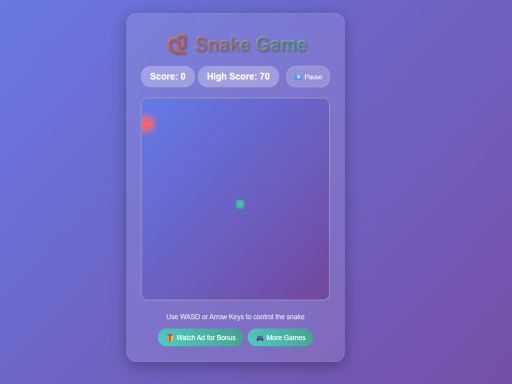Firewall Frenzy
About Firewall Frenzy
Oh man, you *have* to hear about this game I just stumbled upon. Seriously, I’m still buzzing from my last session. It’s called *Firewall Frenzy*, and honestly, it’s one of those rare finds that just grabs you by the collar and doesn’t let go. I mean, I’ve always been drawn to games that put a unique spin on familiar concepts, and this one? It absolutely nails it.
Imagine this: you’re not the hero, you’re not the space marine, you’re not even a plucky adventurer. No, in *Firewall Frenzy*, you are a computer virus. A tiny, insidious, incredibly agile piece of rogue code, and your entire existence is a frantic, high-stakes dance through the digital arteries of a super-secure network. And the goal? To avoid every single scanner, every detection pulse, every firewall that the network’s incredibly aggressive antivirus system throws at you. It’s pure, unadulterated adrenaline, I’m telling you.
The first time I booted it up, I wasn't entirely sure what to expect. The title alone was intriguing, but the actual gameplay? It's something else. You start as this small, almost ethereal wisp of code, a vibrant splash of neon against the dark, intricate circuitry of the network. The visual design alone is stunning; it’s all clean lines, glowing data streams, and pulsating nodes, making the entire environment feel alive, like a breathing, thinking entity. And the sound design! Oh, the sound design. You can almost feel the hum of the servers, the subtle blips and whirs of data packets zipping past, and then, the heart-stopping *thrum* when a scanner activates nearby. It’s immersive in a way few games manage to be.
What I love about games like this is how they manage to take a simple premise and build an entire, complex world around it. You’re not just moving left and right; you’re navigating a three-dimensional labyrinth. Think of it like a digital parkour course, but every surface is a potential trap, and every shadow could be hiding a patrol. The network architecture itself is your playground and your prison. You're constantly weaving through conduits, boosting across open data streams, and slipping through narrow access points, all while trying to predict the next move of the omnipresent antivirus.
The brilliant thing about this is how they’ve translated the abstract concept of a computer network into tangible, visceral gameplay. Those 'scanners' aren't just invisible detection fields; they're these terrifying, sweeping beams of light or pulsating waves that expand and contract, forcing you to time your movements with split-second precision. One wrong move, one tiny miscalculation, and *zap!* You're quarantined, deleted, gone. And the frustration, man, it’s real. You’ll find yourself yelling at the screen, "No, not again!" But that frustration? It just makes the eventual success, that perfect run where you glide through a gauntlet of scanners untouched, feel so incredibly satisfying. It’s that unique blend of challenge and reward that keeps you coming back, promising yourself, "Just one more try."
The real magic happens when you start to understand the rhythm of the network. It’s not just about raw speed; it’s about strategy. You learn the patterns of the different antivirus agents. There are the standard, predictable sweeping scanners, sure, but then you encounter the 'sentinel nodes' that lock onto your trajectory, forcing you to bait them into scanning empty space. And just wait until you encounter the 'data shredders' – these environmental hazards that manifest as unstable energy fields, tearing apart anything that touches them, including you. It’s like the network itself is actively trying to purge you, and you’re fighting for your very existence.
What’s fascinating is how the game encourages different playstyles. You can try to be a speed demon, blasting through sections with sheer velocity, relying on quick reflexes. Or, you can be a ghost, meticulously studying patrol routes, finding tiny blind spots, and waiting for the perfect window to slip past. I’ve found myself doing both, sometimes switching tactics mid-run when a plan goes sideways. There’s something magical about that moment when a strategy finally clicks into place, when you realize that the seemingly impossible gauntlet of scanners actually has a hidden rhythm, a subtle opening if you just observe closely enough. You’ll find yourself leaning forward in your chair, eyes wide, controller gripped tight, almost holding your breath as you execute a perfect sequence of dodges and boosts.
As you progress, you start to 'corrupt' data nodes, which isn't just a fancy way of saying "collect power-ups." No, it feels like you're actually *spreading* yourself, gaining a foothold within the system. These corrupted nodes can grant you temporary buffs, like a 'cloaking field' that makes you briefly invisible to scanners, or an 'overclock' burst that gives you a burst of speed to escape a tight spot. And these aren’t just handed to you; you often have to risk a dangerous detour into a heavily guarded sector to reach them. It adds another layer of risk-reward that I absolutely adore. It makes every decision feel meaningful. Do I play it safe, or do I go for that risky upgrade that could make the next section easier?
The game also has these incredible 'firewall' sections, which are essentially environmental puzzles. They’re not just solid walls you can’t pass; they’re complex energy barriers that require you to reroute power, activate hidden switches, or even 'infect' control nodes in a specific sequence to open a temporary path. These moments break up the high-speed evasion, giving you a chance to breathe, but they also crank up the tension in a different way. You're exposed, stationary, vulnerable, trying to decipher the system’s logic while the clock is ticking and detection levels are steadily rising. The satisfaction of hearing that *clunk* as a firewall disengages, knowing you’ve outsmarted the system, is just pure bliss.
In my experience, the best moments come when you’re on the brink of failure, when you’ve barely scraped through a series of traps, your 'corruption level' (which is essentially your health bar) is critically low, and you suddenly see the exit node. That rush of relief, followed immediately by the renewed focus to make that final push, it’s just exhilarating. You can almost feel the weight of the controller in your hands, the subtle vibrations mirroring the frantic energy on screen. It’s a game that makes you feel like a master hacker, a digital ninja, even when you’re just barely holding on.
And honestly, the replayability is insane. Each network segment feels procedurally generated, or at least heavily randomized, so you’re never quite running the same gauntlet twice. It keeps things fresh, keeps you on your toes, and ensures that every run feels like a new challenge. You’re constantly adapting, learning, and evolving your strategies, just like a real virus would. This makes me wonder about the developers, how they managed to create such a dynamic and engaging experience from such a focused concept. It's truly a testament to clever game design.
Seriously, if you’re into high-octane evasion, strategic puzzle-solving, and that incredible feeling of being the underdog against an overwhelming system, you absolutely *have* to check out *Firewall Frenzy*. It’s more than just a game; it’s an experience. It’ll make your heart race, your palms sweat, and your mind buzz with the thrill of digital rebellion. Don't just take my word for it; go experience the frenzy yourself. You won't regret it.
Imagine this: you’re not the hero, you’re not the space marine, you’re not even a plucky adventurer. No, in *Firewall Frenzy*, you are a computer virus. A tiny, insidious, incredibly agile piece of rogue code, and your entire existence is a frantic, high-stakes dance through the digital arteries of a super-secure network. And the goal? To avoid every single scanner, every detection pulse, every firewall that the network’s incredibly aggressive antivirus system throws at you. It’s pure, unadulterated adrenaline, I’m telling you.
The first time I booted it up, I wasn't entirely sure what to expect. The title alone was intriguing, but the actual gameplay? It's something else. You start as this small, almost ethereal wisp of code, a vibrant splash of neon against the dark, intricate circuitry of the network. The visual design alone is stunning; it’s all clean lines, glowing data streams, and pulsating nodes, making the entire environment feel alive, like a breathing, thinking entity. And the sound design! Oh, the sound design. You can almost feel the hum of the servers, the subtle blips and whirs of data packets zipping past, and then, the heart-stopping *thrum* when a scanner activates nearby. It’s immersive in a way few games manage to be.
What I love about games like this is how they manage to take a simple premise and build an entire, complex world around it. You’re not just moving left and right; you’re navigating a three-dimensional labyrinth. Think of it like a digital parkour course, but every surface is a potential trap, and every shadow could be hiding a patrol. The network architecture itself is your playground and your prison. You're constantly weaving through conduits, boosting across open data streams, and slipping through narrow access points, all while trying to predict the next move of the omnipresent antivirus.
The brilliant thing about this is how they’ve translated the abstract concept of a computer network into tangible, visceral gameplay. Those 'scanners' aren't just invisible detection fields; they're these terrifying, sweeping beams of light or pulsating waves that expand and contract, forcing you to time your movements with split-second precision. One wrong move, one tiny miscalculation, and *zap!* You're quarantined, deleted, gone. And the frustration, man, it’s real. You’ll find yourself yelling at the screen, "No, not again!" But that frustration? It just makes the eventual success, that perfect run where you glide through a gauntlet of scanners untouched, feel so incredibly satisfying. It’s that unique blend of challenge and reward that keeps you coming back, promising yourself, "Just one more try."
The real magic happens when you start to understand the rhythm of the network. It’s not just about raw speed; it’s about strategy. You learn the patterns of the different antivirus agents. There are the standard, predictable sweeping scanners, sure, but then you encounter the 'sentinel nodes' that lock onto your trajectory, forcing you to bait them into scanning empty space. And just wait until you encounter the 'data shredders' – these environmental hazards that manifest as unstable energy fields, tearing apart anything that touches them, including you. It’s like the network itself is actively trying to purge you, and you’re fighting for your very existence.
What’s fascinating is how the game encourages different playstyles. You can try to be a speed demon, blasting through sections with sheer velocity, relying on quick reflexes. Or, you can be a ghost, meticulously studying patrol routes, finding tiny blind spots, and waiting for the perfect window to slip past. I’ve found myself doing both, sometimes switching tactics mid-run when a plan goes sideways. There’s something magical about that moment when a strategy finally clicks into place, when you realize that the seemingly impossible gauntlet of scanners actually has a hidden rhythm, a subtle opening if you just observe closely enough. You’ll find yourself leaning forward in your chair, eyes wide, controller gripped tight, almost holding your breath as you execute a perfect sequence of dodges and boosts.
As you progress, you start to 'corrupt' data nodes, which isn't just a fancy way of saying "collect power-ups." No, it feels like you're actually *spreading* yourself, gaining a foothold within the system. These corrupted nodes can grant you temporary buffs, like a 'cloaking field' that makes you briefly invisible to scanners, or an 'overclock' burst that gives you a burst of speed to escape a tight spot. And these aren’t just handed to you; you often have to risk a dangerous detour into a heavily guarded sector to reach them. It adds another layer of risk-reward that I absolutely adore. It makes every decision feel meaningful. Do I play it safe, or do I go for that risky upgrade that could make the next section easier?
The game also has these incredible 'firewall' sections, which are essentially environmental puzzles. They’re not just solid walls you can’t pass; they’re complex energy barriers that require you to reroute power, activate hidden switches, or even 'infect' control nodes in a specific sequence to open a temporary path. These moments break up the high-speed evasion, giving you a chance to breathe, but they also crank up the tension in a different way. You're exposed, stationary, vulnerable, trying to decipher the system’s logic while the clock is ticking and detection levels are steadily rising. The satisfaction of hearing that *clunk* as a firewall disengages, knowing you’ve outsmarted the system, is just pure bliss.
In my experience, the best moments come when you’re on the brink of failure, when you’ve barely scraped through a series of traps, your 'corruption level' (which is essentially your health bar) is critically low, and you suddenly see the exit node. That rush of relief, followed immediately by the renewed focus to make that final push, it’s just exhilarating. You can almost feel the weight of the controller in your hands, the subtle vibrations mirroring the frantic energy on screen. It’s a game that makes you feel like a master hacker, a digital ninja, even when you’re just barely holding on.
And honestly, the replayability is insane. Each network segment feels procedurally generated, or at least heavily randomized, so you’re never quite running the same gauntlet twice. It keeps things fresh, keeps you on your toes, and ensures that every run feels like a new challenge. You’re constantly adapting, learning, and evolving your strategies, just like a real virus would. This makes me wonder about the developers, how they managed to create such a dynamic and engaging experience from such a focused concept. It's truly a testament to clever game design.
Seriously, if you’re into high-octane evasion, strategic puzzle-solving, and that incredible feeling of being the underdog against an overwhelming system, you absolutely *have* to check out *Firewall Frenzy*. It’s more than just a game; it’s an experience. It’ll make your heart race, your palms sweat, and your mind buzz with the thrill of digital rebellion. Don't just take my word for it; go experience the frenzy yourself. You won't regret it.
Enjoy playing Firewall Frenzy online for free on Midiablog games. This Arcade game offers amazing gameplay and stunning graphics. No downloads required, play directly in your browser!
How to Play
Space Bar or Left Click to jump





Comments
This game is awesome! I love the graphics and gameplay.
One of the best games I've played recently. Highly recommended!